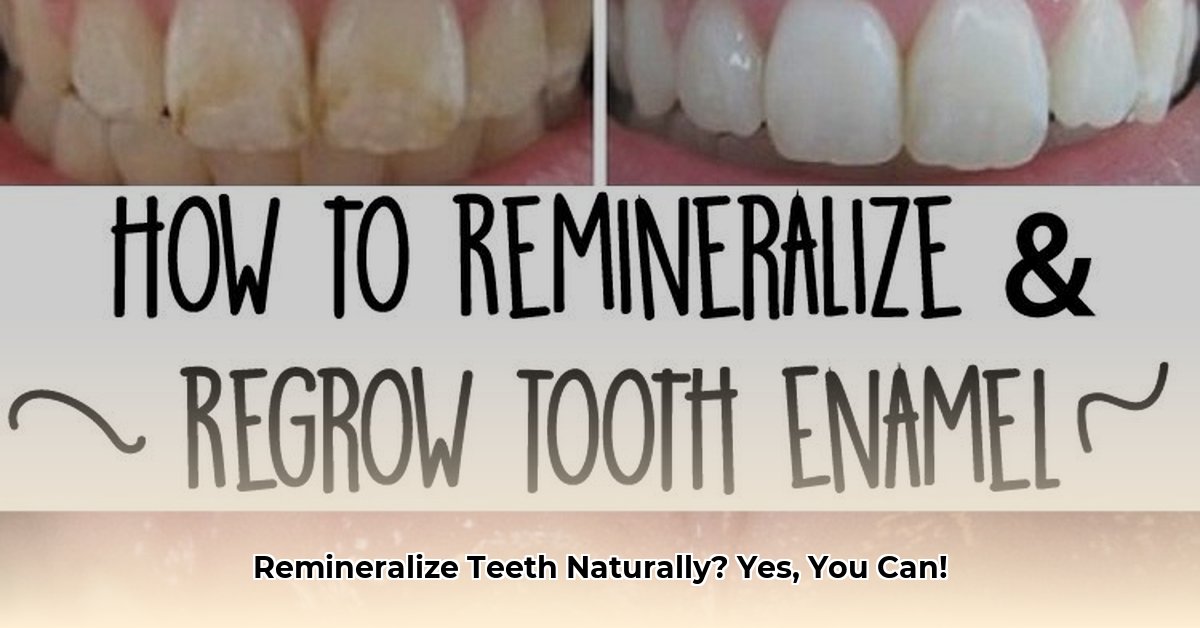Do your teeth twinge when you bite into something cold or sweet? That could be a sign of weakened enamel, the hard, protective outer layer of your teeth. While enamel erosion is common, the good news is that you can take steps to naturally restore and strengthen it at home. This guide provides a comprehensive, step-by-step approach to remineralization, incorporating dietary changes, optimized oral hygiene practices, and other natural remedies.
Step 1: Nourishing Your Enamel
Your diet plays a critical role in remineralization. Think of your teeth as living tissue constantly undergoing renovation. Providing the right “building materials” is essential for strong, resilient enamel.
Foods to Embrace
- Calcium and Phosphorus Powerhouses: These minerals form the foundation of your enamel. Excellent sources include dairy products (milk, cheese, yogurt), leafy greens (kale, spinach), almonds, and meat/fish. If you’re lactose intolerant, consider calcium-fortified plant-based milks.
- Vitamin D – The Essential Helper: This vitamin facilitates calcium absorption. Get your dose from safe sun exposure, fatty fish (salmon, tuna), and fortified foods.
- Vitamin K2 – The Guiding Force: While less discussed, vitamin K2 directs calcium to your teeth and bones, preventing it from accumulating in arteries. Fermented foods like natto and certain cheeses are good sources.
- Magnesium – The Supporting Player: Magnesium works in synergy with calcium and phosphorus. Include foods like spinach, almonds, avocados, and dark chocolate in your diet.
- Foods to Enjoy in Moderation and Be Mindful Preparation: Grains and legumes contain phytic acid which can bind to these nutrients. Soaking, sprouting, or fermenting can significantly reduce phytic acid helping maximize absorption!
Foods to Limit
- Sugary Treats and Drinks: These feed bacteria that produce enamel-eroding acids. Cutting back on soda, candy, and even excessive fruit juice is crucial.
- Acidic Foods and Beverages: These directly dissolve enamel minerals. Limit highly acidic fruits (citrus fruits) and sodas. If you do indulge, rinse your mouth with water afterward.
- Processed Foods: Often high in sugar, salt, and unhealthy fats, processed foods offer minimal nutritional value and can contribute to various health problems, including oral health issues.
Step 2: Optimizing Your Oral Hygiene
Effective oral hygiene is your frontline defense against enamel erosion.
The Essentials:
- Brushing Technique: Brush gently with circular motions twice daily for two minutes each time. Avoid aggressive scrubbing, which can damage enamel.
- Flossing: Floss daily to remove food particles and plaque from between your teeth, where your toothbrush can’t reach.
- Fluoride Toothpaste: Fluoride strengthens enamel. However, some people prefer fluoride-free alternatives.
Exploring Additional Techniques:
- Oil Pulling: Swishing coconut oil (or another oil like sesame) in your mouth for 10-20 minutes may help remove bacteria and improve gum health. While more research is needed, some studies suggest it may be beneficial.
- Xylitol: This natural sweetener found in some gums and candies inhibits the growth of harmful bacteria. It may help remineralize enamel too.
- Hydroxyapatite Toothpaste: Emerging research suggests that hydroxyapatite, a mineral naturally found in teeth, might effectively remineralize enamel, potentially even better than fluoride in some cases.
Step 3: Supplemental Support (With Caution)
If you suspect dietary deficiencies, supplements can provide additional support.
- Vitamin D: If you have limited sun exposure or follow a restricted diet, a vitamin D supplement may be beneficial.
- Calcium/Phosphorus: Consult your doctor before taking these supplements, especially if you have underlying health conditions or take other medications.
Crucially: Always consult your doctor before starting any new supplement regimen.
Step 4: Exploring Other Natural Remedies
Some natural remedies show promise in supporting oral health, although more research is often needed to confirm their effectiveness:
- Green Tea: Rich in antioxidants, green tea may help protect against bacteria and inflammation.
- Grape Seed Extract: Some studies suggest grape seed extract may help reduce plaque formation and support gum health.
- Probiotics: These beneficial bacteria can help balance the oral microbiome, potentially contributing to a healthier mouth. It’s important to note that the impact of probiotics on remineralization is still under investigation.
Step 5: The Long Game: Patience and Prevention
Natural remineralization takes time and consistent effort. Don’t expect overnight miracles.
Long-Term Maintenance:
- Patience is Key: It may take months to see noticeable improvements. Consistency with your dietary changes and oral hygiene practices is essential.
- Regular Dental Checkups: Regular visits to your dentist are vital for monitoring progress, identifying potential issues, and receiving professional cleanings and treatments.
- Professional Intervention: For significant enamel erosion or other serious dental problems, professional intervention is necessary. Your dentist can offer tailored solutions like fillings, crowns, or veneers.
Summary Table: Remineralization Roadmap
| Method | Description |
|---|---|
| Dietary Changes | Prioritize calcium, phosphorus, vitamin D, vitamin K2, and magnesium-rich foods. Limit sugary and acidic intake. Reduce phytic acid by soaking/sprouting. |
| Oral Hygiene | Brush and floss diligently. Consider oil pulling and xylitol. Explore hydroxyapatite toothpaste. |
| Supplements (with caution) | Vitamin D and calcium/phosphorus may be beneficial; consult your doctor first. |
| Other Natural Remedies | Explore green tea, grape seed extract, and probiotics. Further research is ongoing. |
| Long-Term Maintenance | Be patient. Regular dental checkups are essential. Professional intervention may be necessary for significant damage. |
Conclusion
Remineralizing your teeth naturally involves a holistic approach encompassing diet, oral hygiene, and lifestyle choices. While natural methods can be highly effective, they’re not a substitute for professional dental care. Consult your dentist for personalized advice and treatment options, especially if you have significant enamel loss or other oral health concerns. This information is for educational purposes only and does not constitute medical advice. Always consult with a qualified healthcare professional before making any decisions about your health or treatment.
- Divided Meal Prep Containers Make Organizing Healthy Meals Easy - February 15, 2026
- Divided Meal Storage Containers Make Meal Prep Efficient and Simple - February 14, 2026
- Separated Lunch Containers Keep Different Foods Fresh and Organized - February 13, 2026










